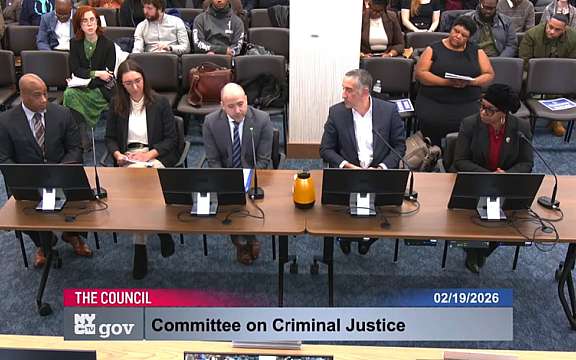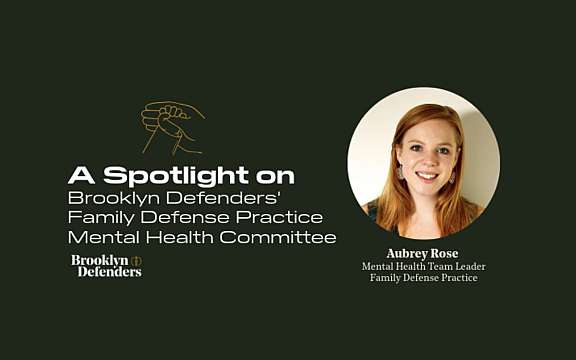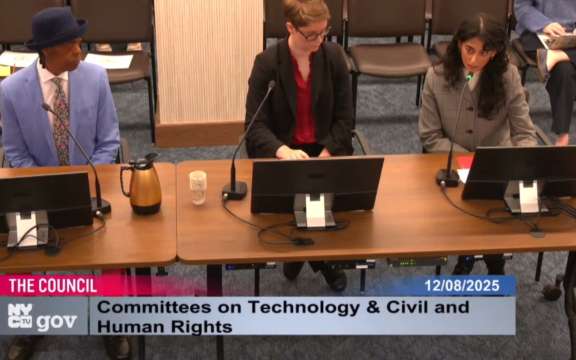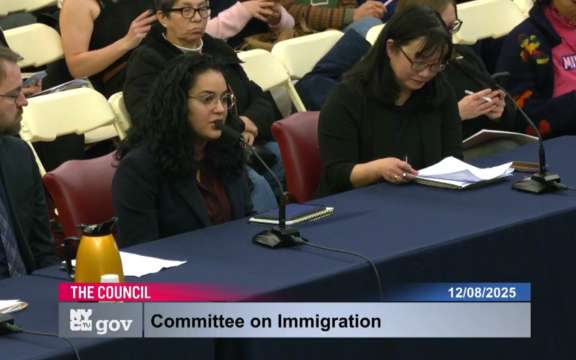BDS Testimony before New York City Human Resources Administration on Barriers to Accessing CityFHEPS
TESTIMONY OF:
Erin Sternlieb, Affordable Housing Specialist
Civil Justice Practice
BROOKLYN DEFENDER SERVICES
Presented before
The New York City Human Resources Administration
August 30, 2021
I. Introduction
My name is Erin Sternlieb, and I am the Affordable Housing Specialist in the Civil Justice Practice at Brooklyn Defender Services. I want to thank the New York City Human Resources Administration for inviting us to testify today. I would like to take this opportunity to speak in support of removing barriers to accessing and using New York City Rental Assistance Programs (CityFHEPS).
Brooklyn Defender Services provides multi-disciplinary and client-centered criminal, family, and immigration defense, as well as civil legal services, social work support and advocacy, for nearly 30,000 people in Brooklyn every year. BDS’ Civil Justice Practice (CJP) aims to reduce the civil collateral consequences for our clients who have had interaction with the criminal, family or immigration legal systems.
The people we serve experience housing instability in a variety of forms: we defend people from eviction in Housing Court, provide proactive relocation assistance and benefits advocacy, and guide clients through the shelter system. In my role as affordable housing specialist, I work with clients who are coming from the shelter system or facing eviction from their current housing to secure stable housing. Through this work I have seen how difficult it is for New Yorkers to use CityFHEPS vouchers to secure safe, affordable, and permanent housing.
BDS commends the City Council for passing Intro. 146 and Mayor Bill DeBlasio, Commissioner Stephen Banks, and HRA staff for expediting the rule change to allow the increased voucher amounts to go into effect this week. The new voucher amounts will drastically increase the pool of available apartments for low-income New Yorkers with City vouchers. This is an important step in reducing homelessness and making sure all New Yorkers have access to housing. This change could not come at a more crucial time, as the COVID-19 pandemic nears its second year, COVID cases continue to rise, and the eviction moratorium is set to expire completely at the end of August. Keeping New Yorkers out of shelter and moving current shelter residents into permanent housing is absolutely essential to public health and safety in New York City. We know the same populations facing housing instability and homelessness are also at greatest risk for serious illness, hospitalization, and death from COVID-9. Increasing voucher amounts to fair market rate will certainly make it easier for voucher holders to find housing. We respectfully offer the following recommendations to ensure this rule change is implemented effectively and to streamline and strengthen the CityFHEPS program.
II. Rule Change and Implementation
Neither housing service providers nor voucher holders have been given details about how this rule change will go into effect and there is no information in the proposed rules. We ask that HRA provide information on how the rule change will be implemented and what steps clients need to take to obtain updated shopping letters as soon as possible.
As we elaborate below, Homebase is already seriously overburdened. To reissue shopping letters for all CityFHEPS voucher holders while continuing to screen new clients would take Homebase months if not longer. HRA and the Mayor’s office clearly understand, as demonstrated by the fast tracking of this rule change, that New Yorkers facing housing instability and families and individuals moving out of shelter need these vouchers now. They cannot afford to wait months for new shopping letters to be processed. We ask that HRA directly issue updated shopping letters for tenants living in the community, without going through the lengthy Homebase voucher issuance process.
III. Obtaining Vouchers
As important as this proposed rule change is, increasing CityFHEPS voucher amounts will only have its desired effect of reducing homelessness if the rule change is implemented efficiently and if the program runs effectively. As the CityFHEPS program operates currently, people seeking assistance face various barriers to obtaining and using their vouchers. For people in the community facing eviction, Homebase is the only organization that can screen them for voucher eligibility and issue shopping letters. Homebase offices in Brooklyn are severely understaffed and have an alarming backlog of cases to screen and process. I have many clients who have been waiting months for an initial screening call from Homebase and even longer to receive a voucher if they are eligible. One client, Ms. A who is facing eviction has been waiting 10 months for Homebase and HRA to issue her a voucher.
As an advocate, it can also be challenging for me to get in touch with Homebase staff to get information about my client’s cases. Homebase caseworkers have told me that they are understaffed, overworked, and do not have the capacity to process all the incoming cases. One caseworker told me there is a six-month waitlist for clients to get processed. A caseworker at another location told me that they are still processing cases from 2020.
New York State’s eviction moratorium expires tomorrow. We anticipate that these delays will only get worse once evictions resume and even more New Yorkers are in dire need of rental assistance. During the waiting period to for vouchers to be processed, people are unable to look for housing, they are experiencing the stress of a pending eviction, and the uncertainty of not knowing where or how they will live, while often also facing harassment from their landlords or other unsafe living conditions. In order for vouchers to be accessible to all eligible New Yorkers, Homebase must be adequately staffed and resourced. HRA must also contract with additional providers to meet this existing and growing need.
IV. Finding Apartments and Source of Income Discrimination
Once people are issued shopping letters, they must actually find an apartment. Even with the increased voucher amounts, I believe finding apartments will continue to be a serious challenge for many New Yorkers without additional resources and better enforcement of source of income discrimination laws. When they are issued CityFHEPS vouchers, clients are given a list of real estate agencies that supposedly work with voucher holders. This list is outdated. Many of the agencies do not have any vacancies and others don’t have a working phone number. Of the hundreds of clients with CityFHEPS vouchers I have worked with over the last year, every single one has been told by a landlord or broker at some point that they do not accept vouchers. Many have heard this dozens of times, or have simply been ignored or hung up on after they mention their voucher. This is extremely demoralizing and turns apartment hunting from a chore into a herculean task.
HRA’s responsibility cannot end with issuing vouchers, they must work to connect voucher holders with landlords willing to work with voucher holders. The NYC Commission on Human Rights has made promising efforts to strengthen its Source of Income Discrimination enforcement, including compelling violators of the law to set aside units for voucher holders. In order for these Source of Income Discrimination protections to have teeth, HRA and Homebase must work more closely with the commission to ensure that voucher holders actually end up in apartments.
If landlords are not willing to accept vouchers, or voucher holders have no way of finding landlords willing to work with them, increasing the voucher amounts will be meaningless. Voucher holders need more thorough information on how to identify, record, and report source of income discrimination. They need a usable list of landlords who accept their vouchers. HRA should maintain and publicly provide a list of buildings with these set-asides.
V. Approval Process
Lastly, the approval phase of the apartment search process acts as a final hurdle preventing tenants from using their vouchers. Once people have gotten through the months-long waiting-period for a voucher, overcome source of income discrimination, and found a landlord willing to work with them, they most go back to Homebase for approval of the apartment and payment to the landlord. Often by the time they have actually found an apartment, their case has been closed and they have to be re-assigned a new caseworker, which can take weeks or longer. Tenants often are required to resubmit documents and paperwork to demonstrate their eligibility, even though they have already been assessed at the outset to receive a shopping letter. As we all know, producing documentation can be an obstacle for many of low-income New Yorkers, causing further delays. People facing housing instability do not always have access to their documents, and people living in poverty do not always have the technology they need to scan or photograph and email their documents. Homebase should maintain documents on file for all clients issued shopping letters. Clients should not have to resubmit their personal documentation, only documentation related to the apartment itself, unless their circumstances have changed.
At this point in the process, communication between landlords, tenants, and Homebase is often confusing or non-existent, causing further delays and jeopardizing a person’s ability to actually move into an apartment. Further, the month-long hold incentive offered to landlords does not cover the entire time the approval takes. One of my clients Ms. J found an apartment and signed a lease to start on November 1st. Homebase could not finish the approval in time, and told the landlord the lease had to be changed to the 15th of the month. The landlord and client met and re-signed the lease, only to be told leases had to start on the first of the next month. In total Ms. J waited more than two months after finding an apartment to move in and was unable to reunite with her son who was in foster care during this time. Unfortunately, this timeline is typical. Landlords often get frustrated with the wait and lack of clear communication, so they move on to applicants without vouchers who can move more quickly.
The small number of my clients who have been able to find an apartment with their CityFHEPS vouchers and complete the approval process have all had issues getting checks sent to their new landlords. Checks often go missing or are never processed. To get checks issued often requires follow up from our office. For tenants without advocates to troubleshoot these issues for them, this becomes an insurmountable obstacle. This process must be streamlined. HRA must work to strengthen communication between the Rental Assistance Unit, Homebase, voucher holders, landlords, and advocates so the approval process runs smoothy and quickly and essential steps are not missed.
VI. Conclusion
Permanent affordable housing is the foundation many New Yorkers, including the people we serve, need to find stability in their lives. Stable housing can help our clients favorably resolve their criminal cases and reunite with their children after ACS involvement. CityFHEPS vouchers set at Fair Market Rate can absolutely be the ticket to stable housing for many New Yorkers if the rule change is implemented efficiently and other key changes are made to strengthen the program. In order for vouchers to reduce homelessness they must lead to permanent housing. We urge HRA to strongly consider our recommendations to (1) bypass Homebase for issuing updated shopping letters, (2) increase staffing and resources for Homebase offices, (3) contract additional providers to screen clients and issue CityFHEPS vouchers, (4) offer additional resources to connect voucher holders with landlords and to help clients overcome source of income discrimination, and (5) streamline the apartment approval process.
Thank you for your time and consideration of our comments. We look forward to further discussing these and other issues that impact the communities we serve. If you have any additional questions, please contact Alex Dougherty, Senior Attorney and Policy Counsel, at adougherty@bds.org.



